Hindu Metroplus, From earth to earth
Uzhave thalai 2.0 organised by The Indian Chamber for Commerce and Industry Coimbatore,for the second consecutive year, took place at the Hindustan Arts and Science College. The kit given to each participant comprised among other things a booklet containing elaborate information on sustainable farming and introductory notes on the speakers.
The Chief guest for the day was S.K.M Mayilanantham who was honoured for his visionary contributions to the farming sector. Despite being under the weather he said this was one conference that he just had to attend.He delighted in the fact that an organisation such as the Chamber for Commerce and Industry was devoting an entire day’s event just to focus on the agricultural sector.He said it must be highlighted that without this sector being given it’s due importance all other industry cannot thrive in the long run. Food being one of the vital necessities of man not only governs his health and well-being but also has a great influence on the functioning of the economy.Hailing from a family of agriculturists he started his inaugural address by talking about the difficulties that he has experienced through decades of farming and the many challenges constantly faced by the farming community. By putting in a place an effective marketing network ,he has been able to assist over 2000 farmers in earning a consistent source of income.
Any participant attending the Uzhave thalai who is involved in farming would agree that a conference of this nature was and will continue to be extremely beneficial to everyone who works closely with land. The kind of information shared by experts in this field is of a diverse and most importantly of a doable nature. The current chairperson and her team have formed a much needed foundation to help the community of both the traditional farmer and the new urban farm aspirant. This year the agenda taken up by the team at Uzhave thalai was to invite speakers who could provide insight into tackling 3 core issues that plague farmers. They were soil conditioning ,watershed management, pest prevention and how best to achieve these in an organic manner.
Soil conditioning
The first session was conducted by the dynamic Dr.Sultan Ismail who is known for his pragmatic approach to natural farming methods.He vetoed the dais and preferred instead a more personal interaction with the delegates.His power point presentation was about looking at the soil from an earthworm’s perspective.He pointed out that soil is actually odourless much like water and it is the microbes that live in the soil which allow for a thriving bio diversity. These organisms can distinguish between decomposition and growth. Natural ploughing he says aerated the soil and the dung from livestock provided the nutrients necessary for different kinds of earthworms to dwell in each layer of the soil.By switching over to mechanical ploughing the compressed soil not only needs air but also nutrition from natural sources like animal manure , probiotics from buttermilk,natural mulching from leaves and simple organic sprays. It is essential to “re worm the world” and go from being crop centric to farmer centric.
P.Sethuraman from Villipuram echoed the same sentiments adding that the organic carbon content in the soil must increase by planting natural nitrogen fixers like sannapai and thakkapundu. Mann valam is vital to avoid the land from turning barren.If allowed to wash away,one inch of top soil takes 250 years to form!
“The earth has music for those who listen”-Dr.Sultan Ismail
Watershed management
M.V.Ram Chandrudu has worked closely with several State Governments in promoting watershed development and rain fed agriculture. Put very simply what each farm needs to look at it’s ‘watershed governance’. By that he means that farming must be location centric. Cultivation of of water intensive crops can only be successful in a region which has adequate rainfall.A point of grave concern is that now most farms are fed by bore well water that go down several hundred feet and use up precious ground water.Farming must instead depend on natural water sources like rain,open wells , rivers and streams.This is the reason why borewells are failing and water scarcity is growing dramatically.
While aquifers went to a depth of 30 to 50 feet ,borewells are almost reaching a 1000 feet. It is important to ensure that as a country every farmer has a right to this precious resource.Water conservation alone is not enough. Utilisation must be equally effective.Drought prone districts growing paddy which is ecologically inappropriate will lead to distraught farmers and political upheaval.
S.Raja durai has put in place a system since 1997 wherein he uses a marginal amount of water to nurture his coconut grove.From wanting to see the bottom of a well in the early 80s to wishing it full decades later he has understood the vital need for water conservation.By digging a 9 inch by 4 inch trench between two rows of coconut trees it allows the drip line to run closer to the roots and less is lost by way of evaporation. He has reduced the time of running water from 3 hours to 1 hour.While at one point in time agriculture was rain centric ,we now expect land to yield throughout the year. Only with proper “panpadu” can land thrive. He adds that land can be “more temperamental than family members” Pannai kuttai or percolation ponds for rain water harvesting is the way forward for any farm.
Pest control
Just like the human body needs a proper diet to ward off diseases similarly the soil and plants must be nurtured by spraying natural disinfectants and fed organic matter on a regular basis. Sundar Raman Ayya credits all his know how to being guided by visionaries like Namalvar who instilled in him a love for the land. Highly eloquent in both Tamil and English he talked about the importance of creating a healthy environment for the rhizosphere. By using natural pest control methods like Panchakavya,Amuthakarasal, Neem , Aloe vera, Thulasi, Arappu etc the farmer can create “ideal conditions for the beneficial microbes to have the dominant role” Natural regeneration of the soil can cut carbon emissions by trapping carbon dioxide in the soil. And here we think that only trees have the capacity to absorb vehicular fumes.
T.Govindarajan co-founded Pasumai perayam and has trained over 5000 farmers in organic farming practices.He follows time tested methods to ward of pest attacks by using a ginger, garlic and green chillies mixture, alfalfa,caladula,turmeric powder,perungayam etc and talks of enriching the soil with the leaves of moringa,curry leaf,nochi and yerukallai to name a few. Growing seasonal vegetables ,he says,will also control pests.
Profitability
Having trained more than 158 women farmers M.Krishnamurthy is the recipient of many awards for his outstanding contribution to farming.”Why are we paying money to be poisoned?” is a valid question he asks.Consumers must get facts straight before bashing organic farming methods. In his view sustainable farming methods will have a great impact on climatic conditions and multi cropping is the key to tide over losses in this sector.
Madhu Ramakrishnan who has inspired many farmers from far and wide has used his farm at Anaimalai as a model to enourage proper agricultural concepts.Having created a diverse eco system he is a firm believer in permaculture. He promotes multi-level farming and follows his formula of no weeding, no ploughing ,less wastage of natural resources which makes for reduced work and better profitability.
People who attended this year’s Uzhave thalai were also given the opportunity to be a part of a farmer’s network which will meet and support each other on a regular basis.The enthusiasm displayed by each one of these speakers gave more than enough motivation for a farmer looking to make a difference.
All pictures of the speakers at the conference are courtesy of the Indian Chamber for Commerce and Industry Coimbatore.

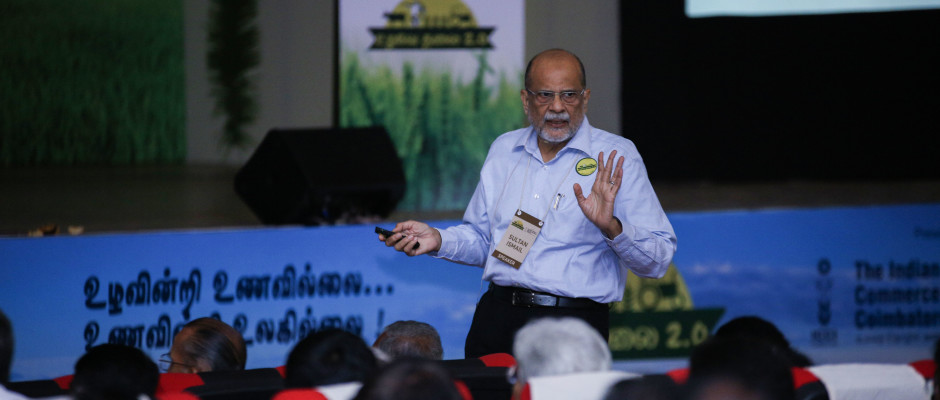
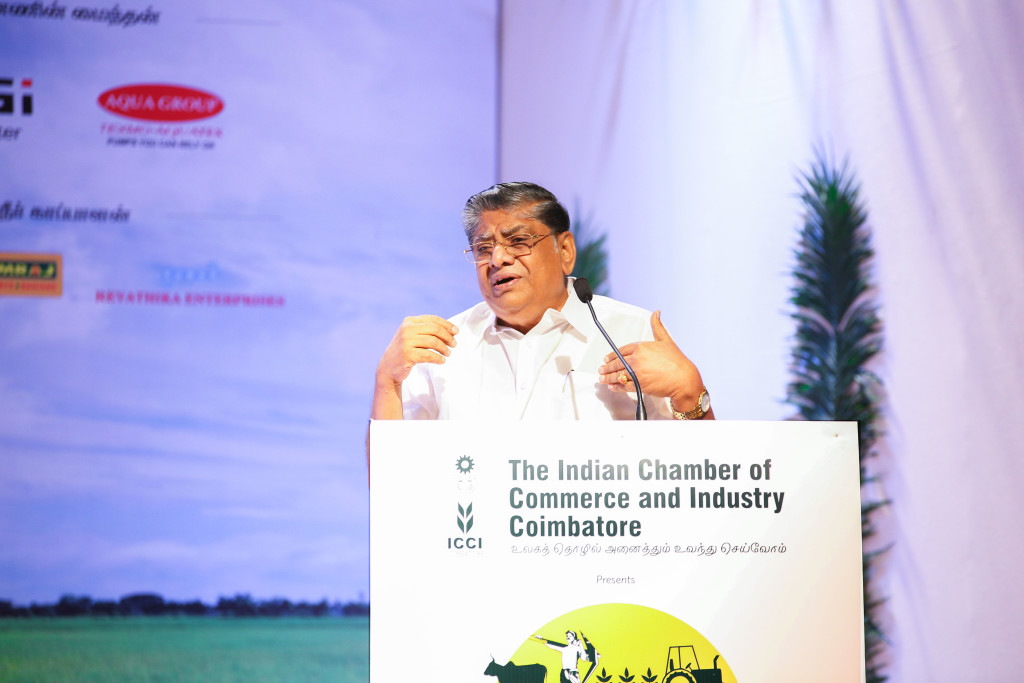

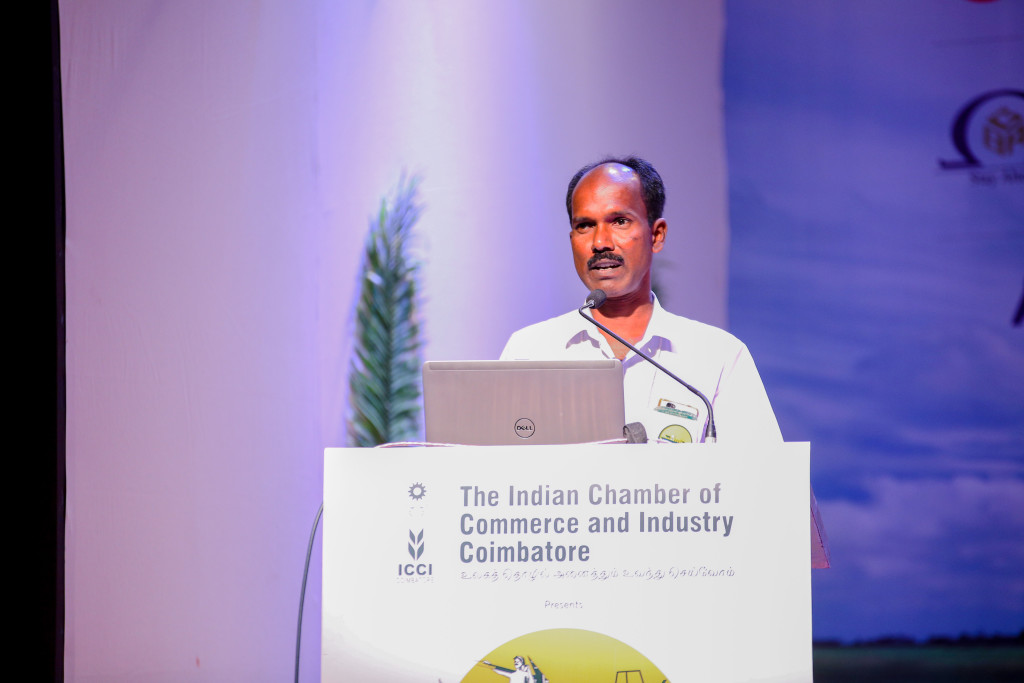
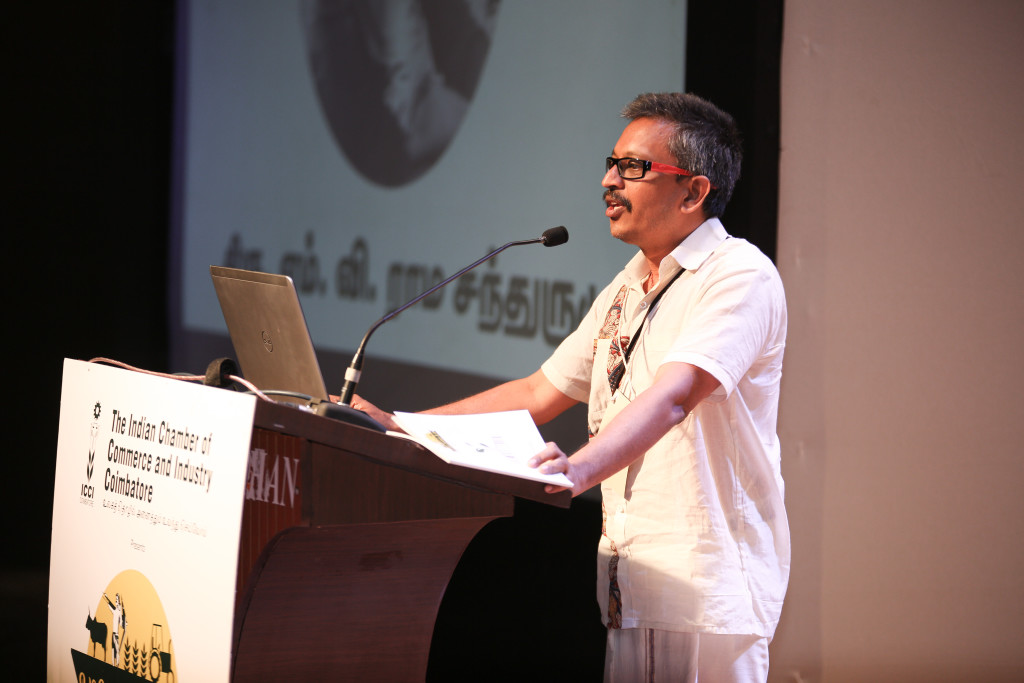
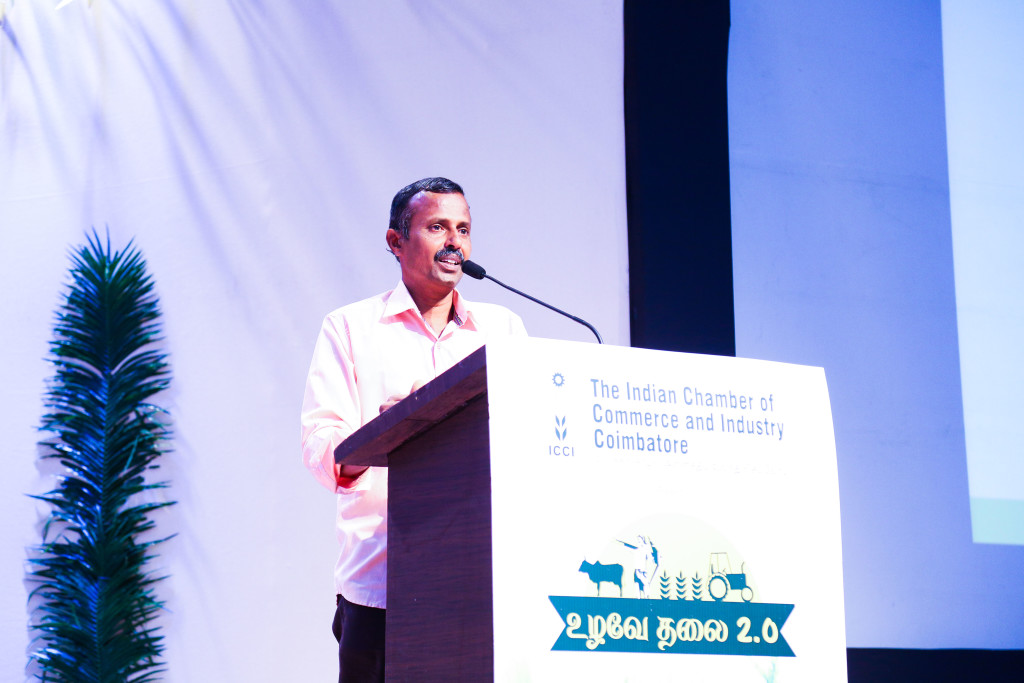
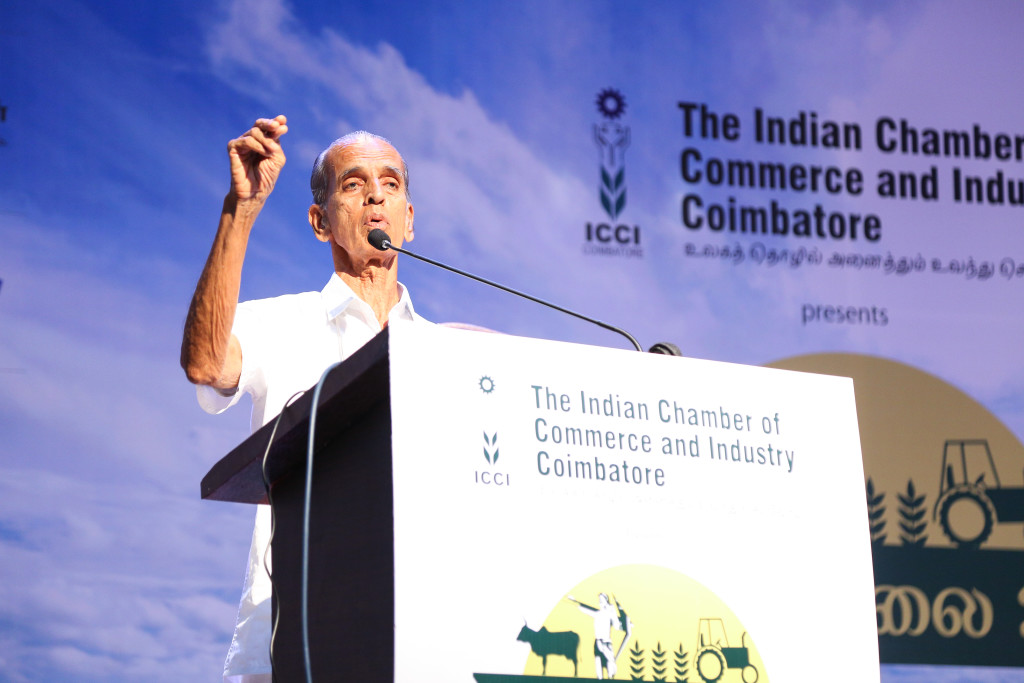
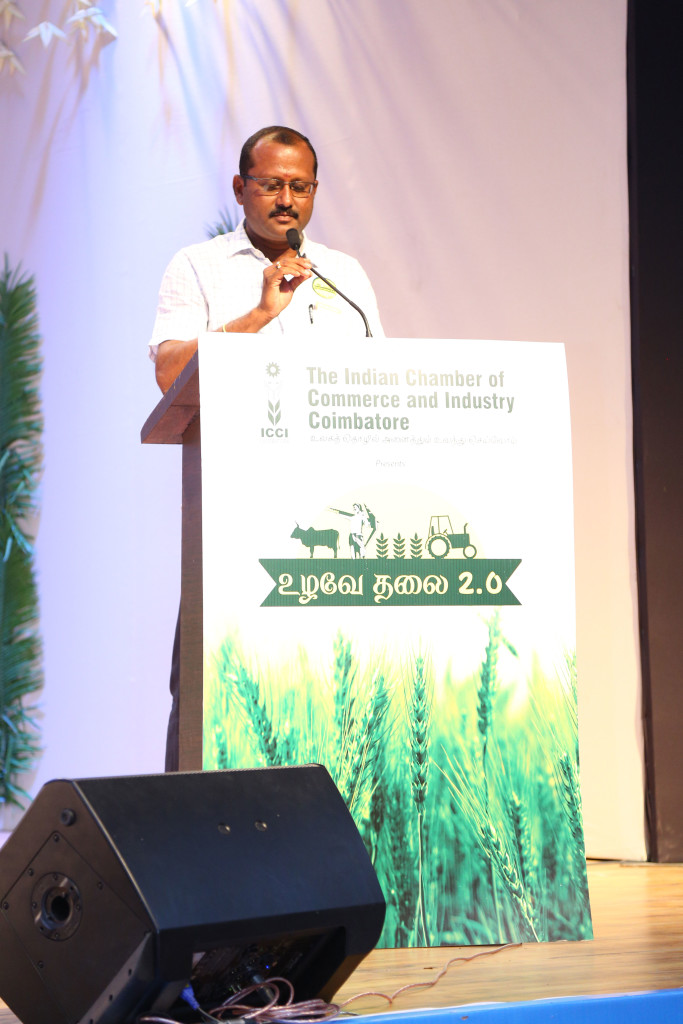

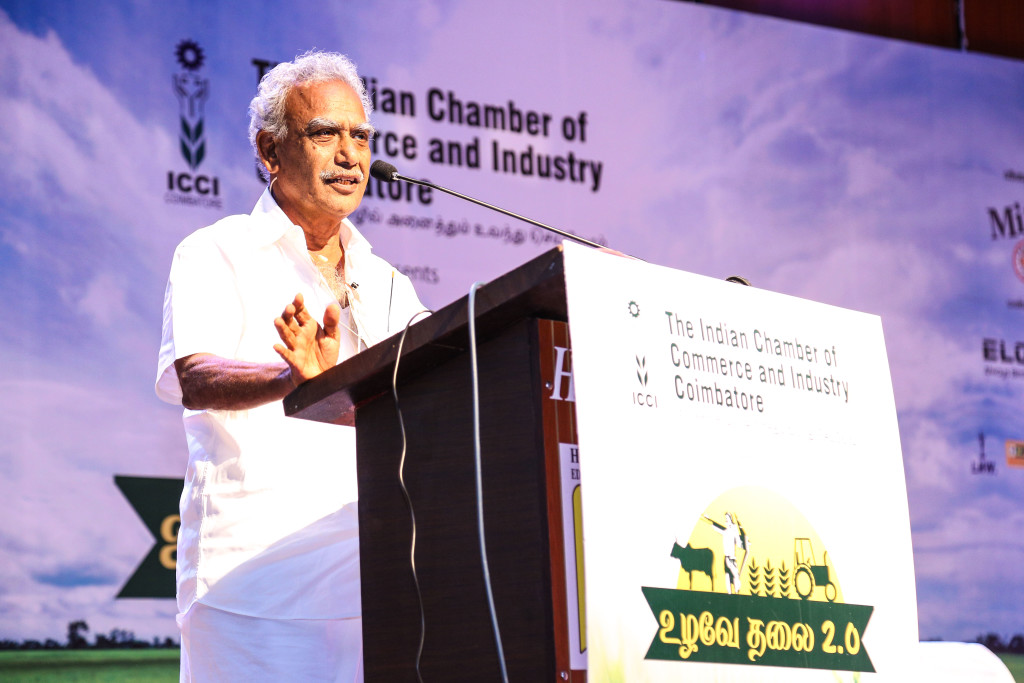
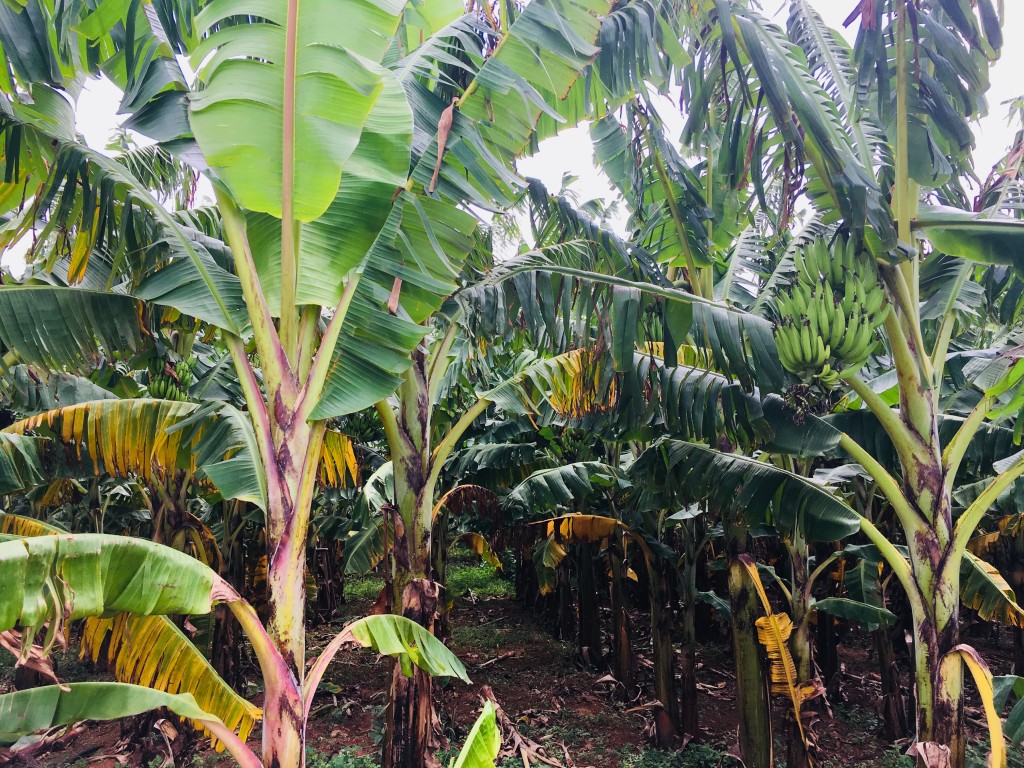
No comments yet.